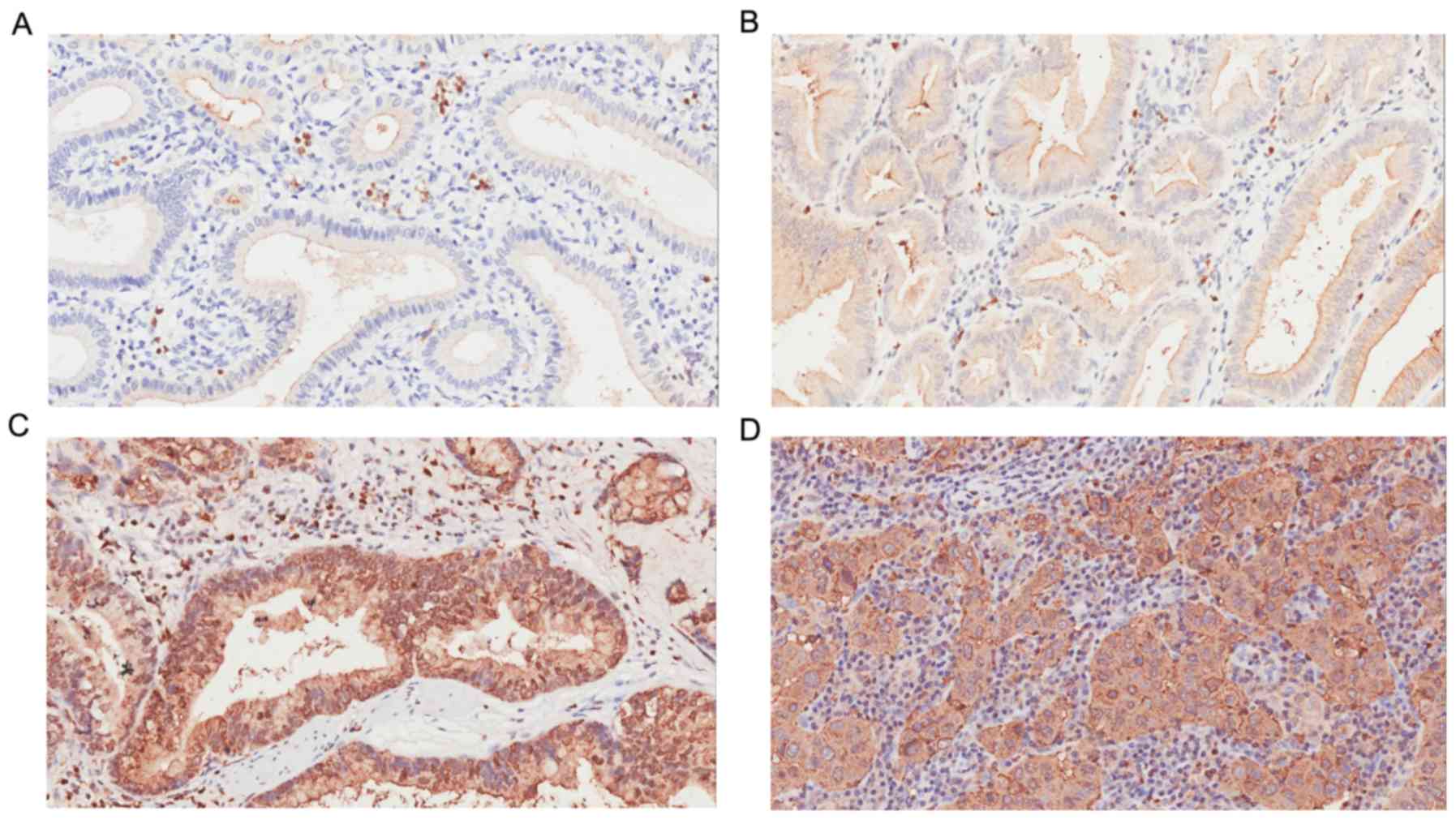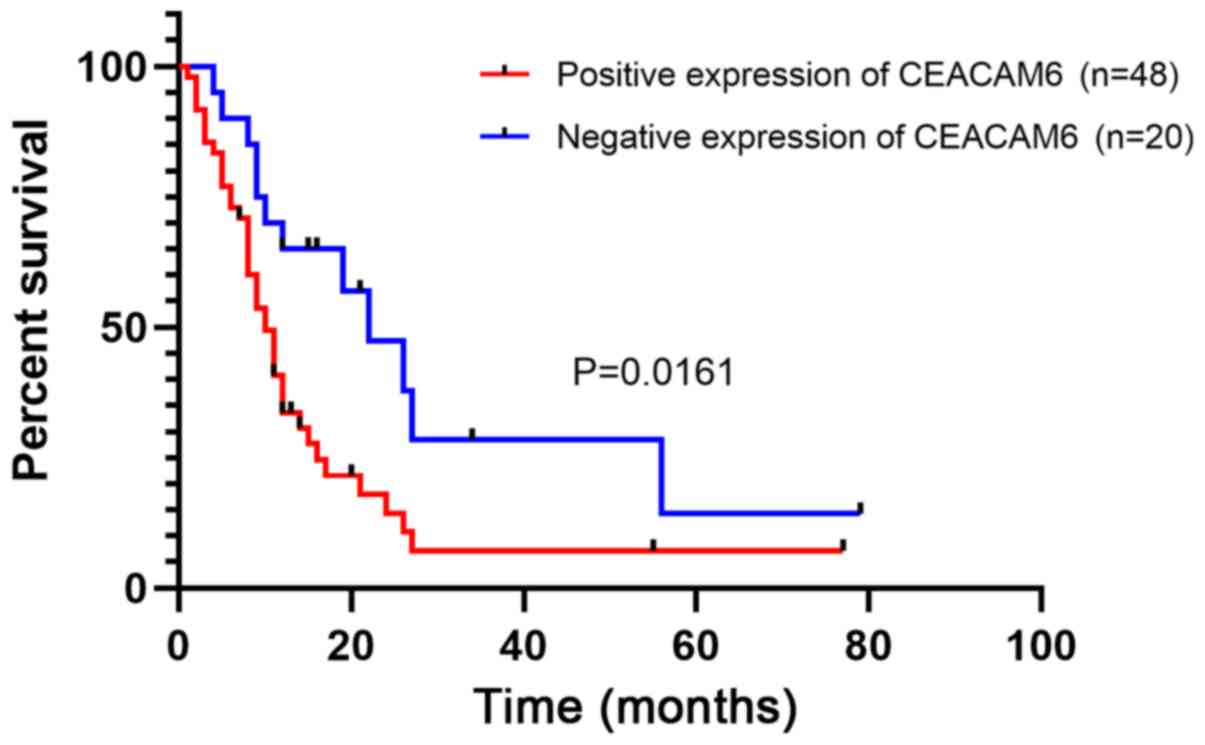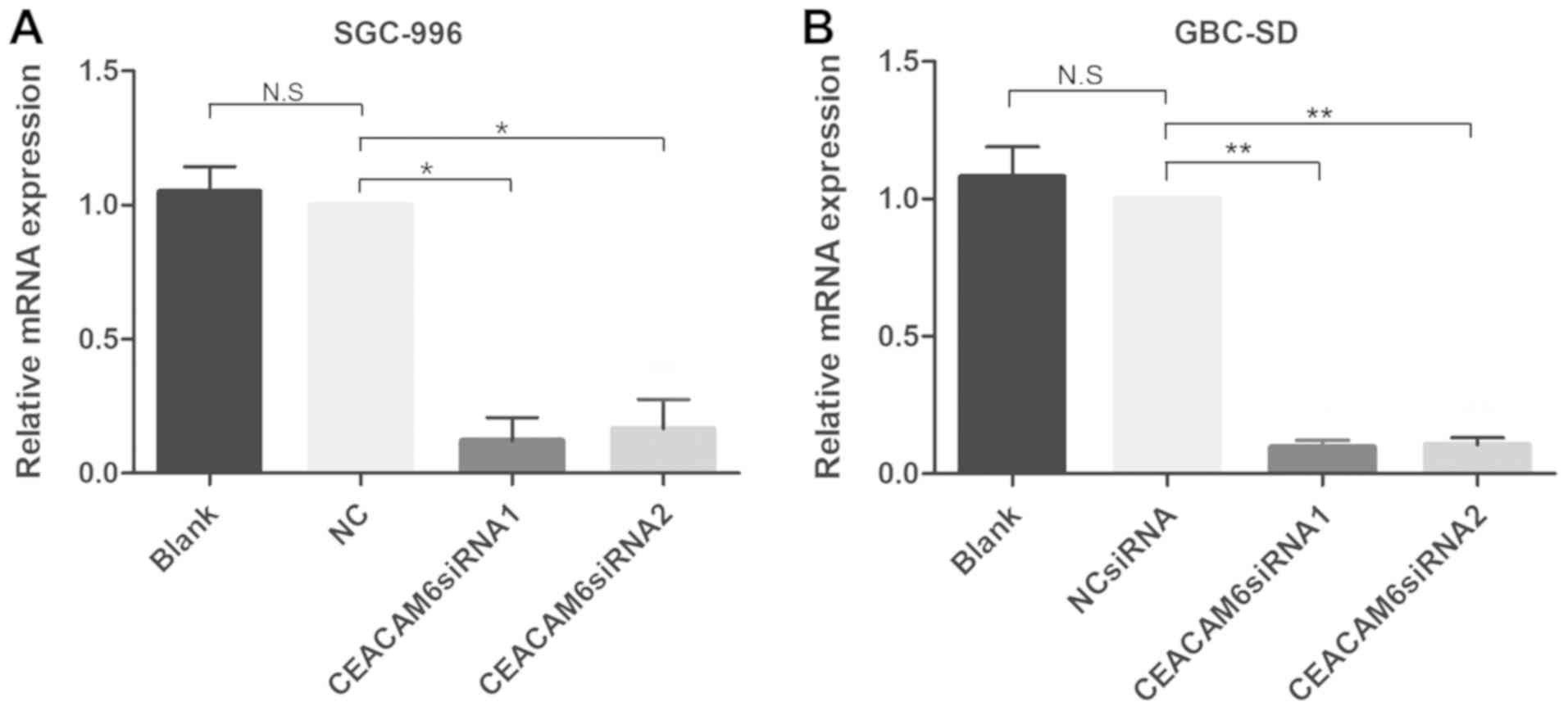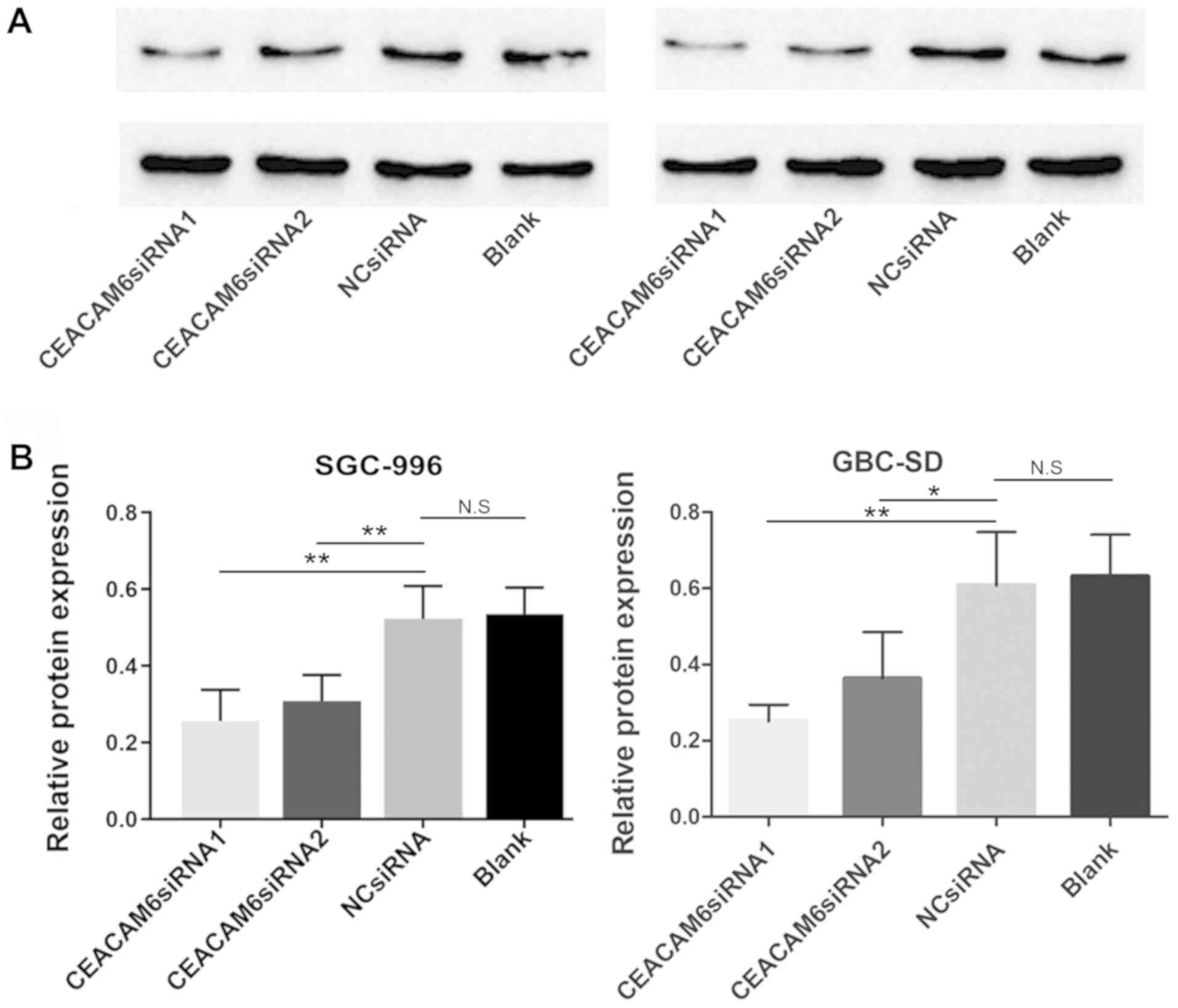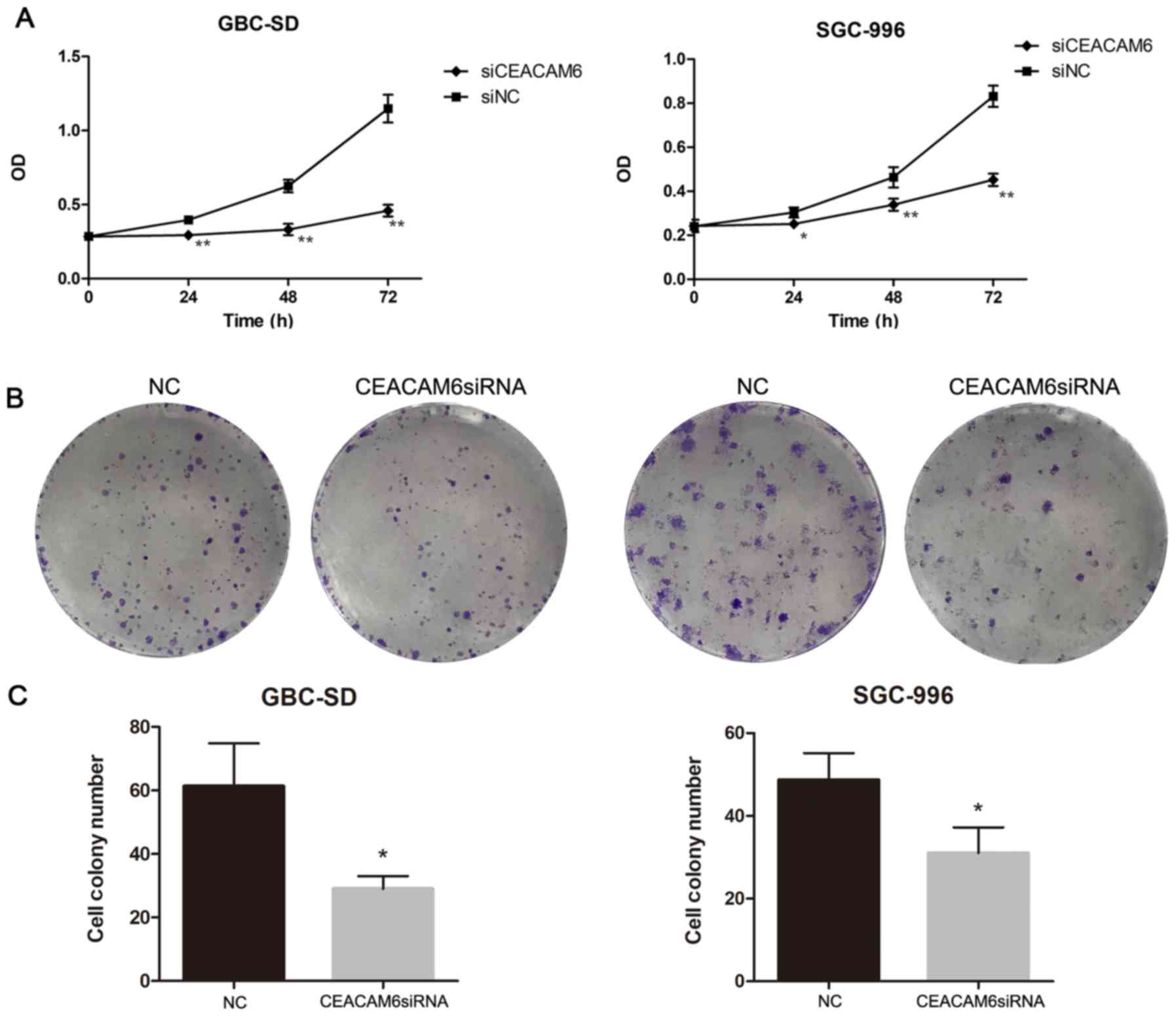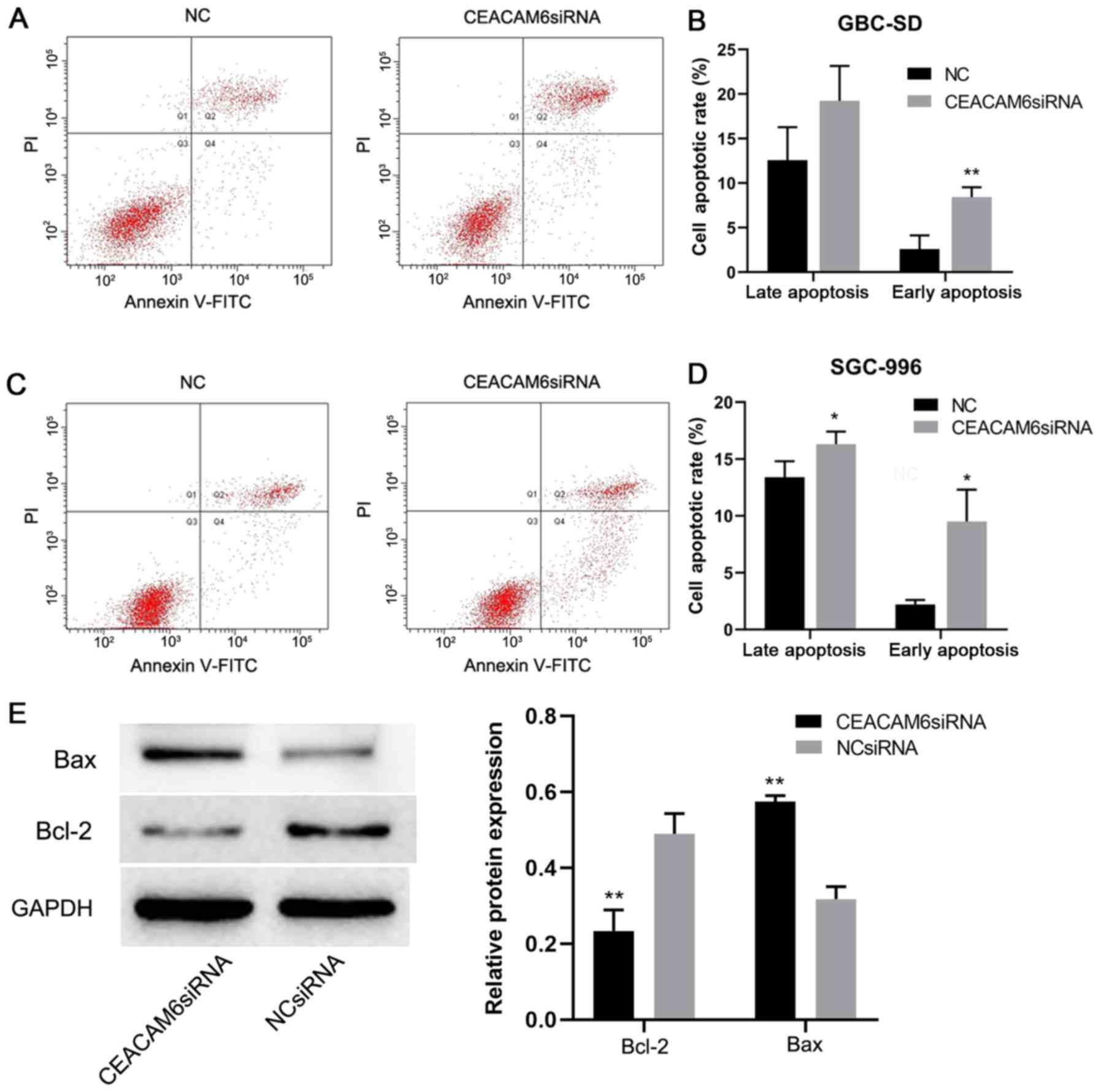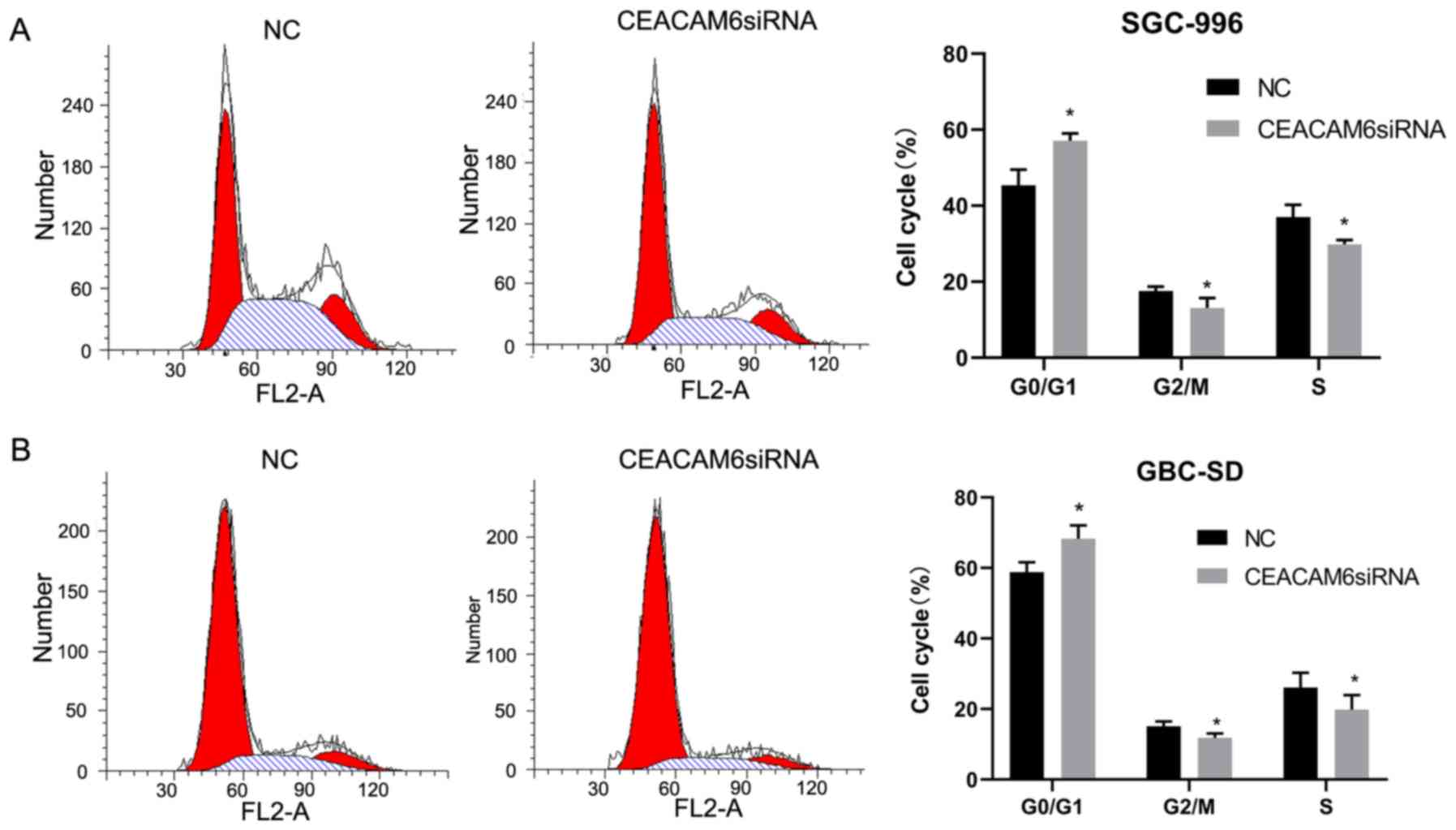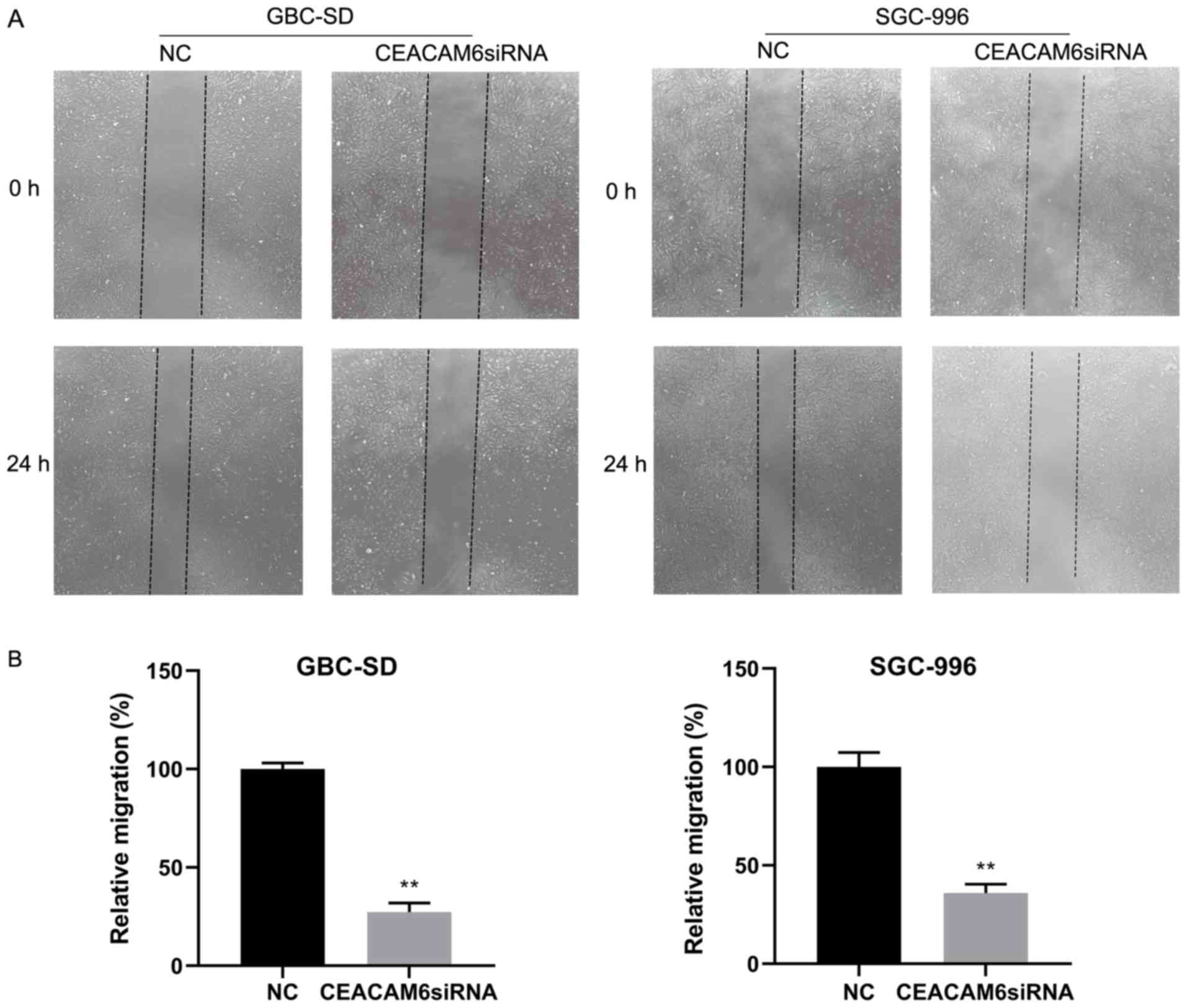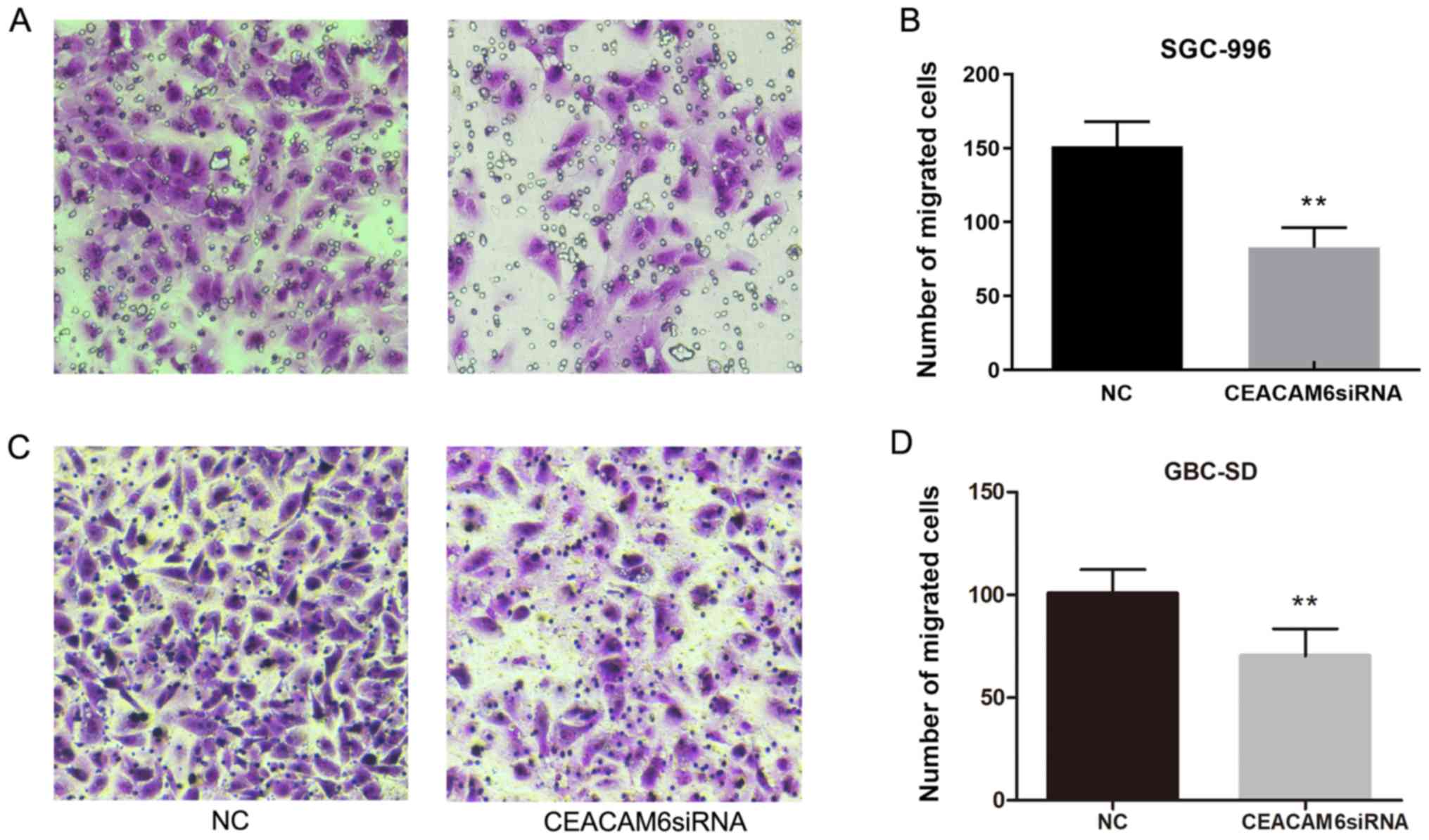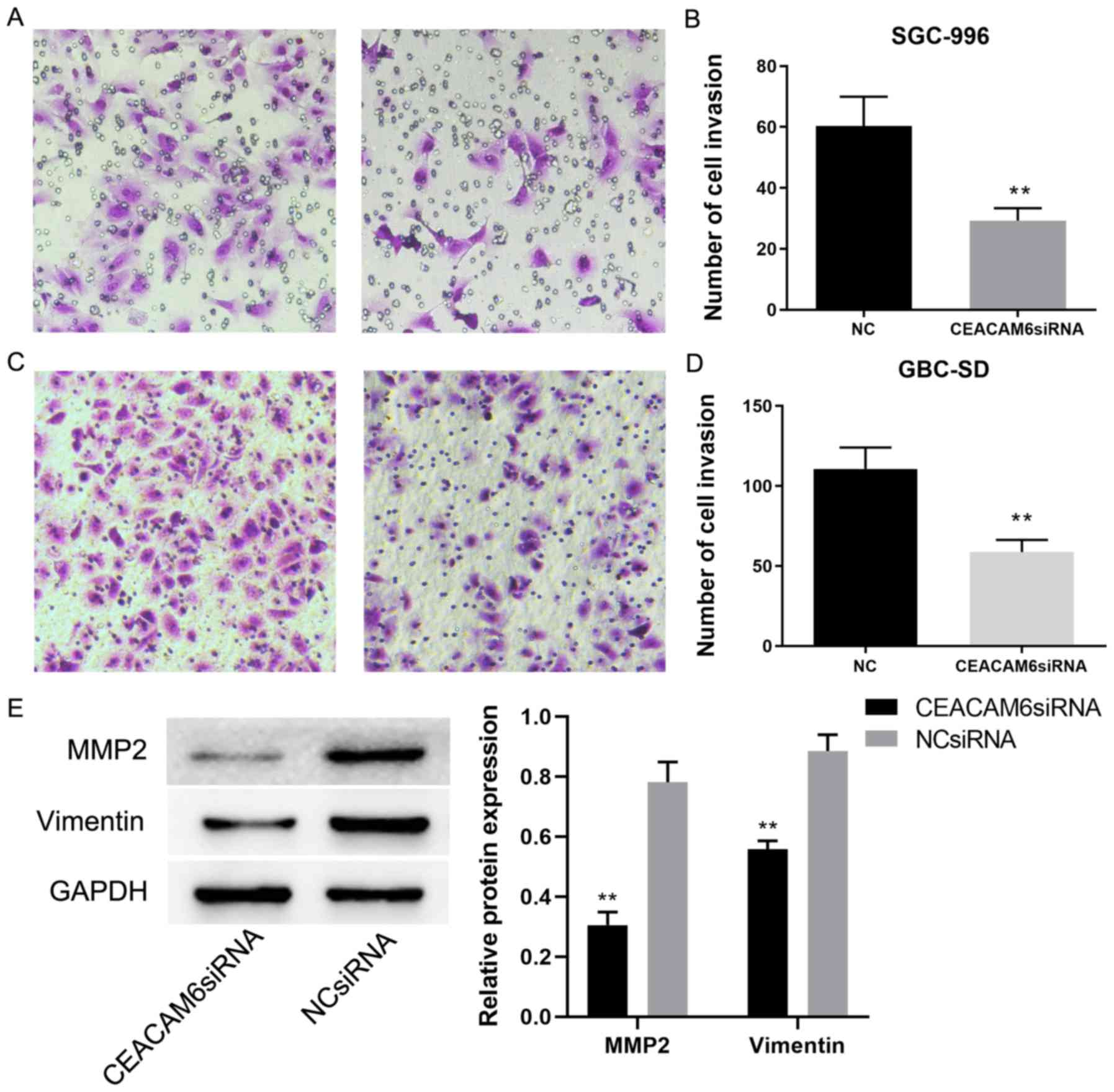|
1
|
Sharma A, Sharma KL, Gupta A, Yadav A and
Kumar A: Gallbladder cancer epidemiology, pathogenesis and
molecular genetics: Recent update. World J Gastroenterol.
23:3978–3998. 2017. View Article : Google Scholar : PubMed/NCBI
|
|
2
|
Hari DM, Howard JH, Leung AM, Chui CG, Sim
MS and Bilchik AJ: A 21-year analysis of stage I gallbladder
carcinoma: Is cholecystectomy alone adequate? HPB (Oxford).
15:40–48. 2013. View Article : Google Scholar : PubMed/NCBI
|
|
3
|
Dwivedi AN, Jain S and Dixit R: Gall
bladder carcinoma: Aggressive malignancy with protean loco-regional
and distant spread. World J Clin Cases. 3:231–244. 2015. View Article : Google Scholar : PubMed/NCBI
|
|
4
|
Singer BB, Scheffrahn I, Kammerer R,
Suttorp N, Ergun S and Slevogt H: Deregulation of the CEACAM
expression pattern causes undifferentiated cell growth in human
lung adenocarcinoma cells. PLoS One. 5:e87472010. View Article : Google Scholar : PubMed/NCBI
|
|
5
|
Cheng TM, Murad YM, Chang CC, Yang MC,
Baral TN, Cowan A, Tseng SH, Wong A, Mackenzie R, Shieh DB and
Zhang J: Single domain antibody against carcinoembryonic
antigen-related cell adhesion molecule 6 (CEACAM6) inhibits
proliferation, migration, invasion and angiogenesis of pancreatic
cancer cells. Eur J Cancer. 50:713–721. 2014. View Article : Google Scholar : PubMed/NCBI
|
|
6
|
Duxbury MS, Ito H, Benoit E, Ashley SW and
Whang EE: CEACAM6 is a determinant of pancreatic adenocarcinoma
cellular invasiveness. Br J Cancer. 91:1384–1390. 2004. View Article : Google Scholar : PubMed/NCBI
|
|
7
|
Yan L, Wang Y, Wang ZZ, Rong YT, Chen LL,
Li Q, Liu T, Chen YH, Li YD, Huang ZH and Peng J: Cell motility and
spreading promoted by CEACAM6 through cyclin D1/CDK4 in human
pancreatic carcinoma. Oncol Rep. 35:418–426. 2016. View Article : Google Scholar : PubMed/NCBI
|
|
8
|
Sanchez-Carbayo M: Antibody microarrays as
tools for biomarker discovery. Methods Mol Biol. 785:159–182. 2011.
View Article : Google Scholar : PubMed/NCBI
|
|
9
|
Nagtegaal ID, Odze RD, Klimstra D, Paradis
V, Rugge M, Schirmacher P, Washington MK, Carneiro F and Cree IA;
WHO Classification of Tumours Editorial Board, : The 2019 WHO
classification of tumours of the digestive system. Histopathology.
76:182–188. 2020. View Article : Google Scholar : PubMed/NCBI
|
|
10
|
Xiong L, Deng X, Wen Y, Yang Z and Miao X:
Association of BDNF and BMPR1A with clinicopathologic parameters in
benign and malignant gallbladder lesions. World J Surg Oncol.
11:802013. View Article : Google Scholar : PubMed/NCBI
|
|
11
|
Yuan LW, Liu DC and Yang ZL: Correlation
of S1P1 and ERp29 expression to progression, metastasis, and poor
prognosis of gallbladder adenocarcinoma. Hepatobiliary Pancreat Dis
Int. 12:189–195. 2013. View Article : Google Scholar : PubMed/NCBI
|
|
12
|
Deng X and Pei D: Ornithine decarboxylase
and glutamate decarboxylase 65 as prognostic markers of gallbladder
malignancy: A clinicopathological study in benign and malignant
lesions of the gallbladder. Mol Med Rep. 7:413–418. 2013.
View Article : Google Scholar : PubMed/NCBI
|
|
13
|
Schmittgen TD and Livak KJ: Analyzing
real-time PCR data by the comparative C(T) method. Nat Protoc.
3:1101–1108. 2008. View Article : Google Scholar : PubMed/NCBI
|
|
14
|
Yuan HX, Wang WP, Guan PS, Lin LW, Wen JX,
Yu Q and Chen XJ: Contrast-enhanced ultrasonography in differential
diagnosis of focal gallbladder adenomyomatosis and gallbladder
cancer. Clin Hemorheol Microcirc. 70:201–211. 2018. View Article : Google Scholar : PubMed/NCBI
|
|
15
|
Montalvo-Jave EE, Rahnemai-Azar AA,
Papaconstantinou D, Deloiza ME, Tsilimigras DI, Moris D,
Mendoza-Barrera GE, Weber SM and Pawlik TM: Molecular pathways and
potential biomarkers in gallbladder cancer: A comprehensive review.
Surg Oncol. 31:83–89. 2019. View Article : Google Scholar : PubMed/NCBI
|
|
16
|
Kelleher M, Singh R, O'Driscoll CM and
Melgar S: Carcinoembryonic antigen (CEACAM) family members and
inflammatory bowel disease. Cytokine Growth Factor Rev. 47:21–31.
2019. View Article : Google Scholar : PubMed/NCBI
|
|
17
|
Klaile E, Müller MM, Schäfer MR, Clauder
AK, Feer S, Heyl KA, Stock M, Klassert TE, Zipfel PF, Singer BB and
Slevogt H: Binding of candida albicans to human CEACAM1 and CEACAM6
modulates the inflammatory response of intestinal epithelial cells.
MBio. 8:e021422017. View Article : Google Scholar : PubMed/NCBI
|
|
18
|
Beauchemin N and Arabzadeh A:
Carcinoembryonic antigen-related cell adhesion molecules (CEACAMs)
in cancer progression and metastasis. Cancer Metastasis Rev.
32:643–671. 2013. View Article : Google Scholar : PubMed/NCBI
|
|
19
|
Gebauer F, Wicklein D, Horst J, Sundermann
P, Maar H, Streichert T, Tachezy M, Izbicki JR, Bockhorn M and
Schumacher U: Carcinoembryonic antigen-related cell adhesion
molecules (CEACAM) 1, 5 and 6 as biomarkers in pancreatic cancer.
PLoS One. 9:e1130232014. View Article : Google Scholar : PubMed/NCBI
|
|
20
|
Balk-Møller E, Kim J, Hopkinson B,
Timmermans-Wielenga V, Petersen OW and Villadsen R: A marker of
endocrine receptor-positive cells, CEACAM6, is shared by two major
classes of breast cancer: Luminal and HER2-enriched. Am J Pathol.
184:1198–1208. 2014. View Article : Google Scholar : PubMed/NCBI
|
|
21
|
Strickland LA, Ross J, Williams S, Ross S,
Romero M, Spencer S, Erickson R, Sutcliffe J, Verbeke C, Polakis P,
et al: Preclinical evaluation of carcinoembryonic cell adhesion
molecule (CEACAM) 6 as potential therapy target for pancreatic
adenocarcinoma. J Pathol. 218:380–390. 2009. View Article : Google Scholar : PubMed/NCBI
|
|
22
|
Zhao ZS, Li L, Wang HJ and Wang YY:
Expression and prognostic significance of CEACAM6, ITGB1, and CYR61
in peripheral blood of patients with gastric cancer. J Surg Oncol.
104:525–529. 2011. View Article : Google Scholar : PubMed/NCBI
|
|
23
|
Kim KS, Kim JT, Lee SJ, Kang MA, Choe IS,
Kang YH, Kim SY, Yeom YI, Lee YH, Kim JH, et al: Overexpression and
clinical significance of carcinoembryonic antigen-related cell
adhesion molecule 6 in colorectal cancer. Clin Chim Acta.
415:12–19. 2013. View Article : Google Scholar : PubMed/NCBI
|
|
24
|
Jantscheff P, Terracciano L, Lowy A,
Glatz-Krieger K, Grunert F, Micheel B, Brümmer J, Laffer U, Metzger
U, Herrmann R and Rochlitz C: Expression of CEACAM6 in resectable
colorectal cancer: A factor of independent prognostic significance.
J Clin Oncol. 21:3638–3646. 2003. View Article : Google Scholar : PubMed/NCBI
|
|
25
|
Zhang Y, Zang M, Li J, Ji J, Zhang J, Liu
X, Qu Y, Su L, Li C, Yu Y, et al: CEACAM6 promotes tumor migration,
invasion, and metastasis in gastric cancer. Acta Biochim Biophys
Sin (Shanghai). 46:283–290. 2014. View Article : Google Scholar : PubMed/NCBI
|
|
26
|
Zang M, Zhang B, Zhang Y, Li J, Su L, Zhu
Z, Gu Q, Liu B and Yan M: CEACAM6 promotes gastric cancer invasion
and metastasis by inducing epithelial-mesenchymal transition via
PI3K/AKT signaling pathway. PLoS One. 9:e1129082014. View Article : Google Scholar : PubMed/NCBI
|
|
27
|
Chen J, Li Q, An Y, Lv N, Xue X, Wei J,
Jiang K, Wu J, Gao W, Qian Z, et al: CEACAM6 induces
epithelial-mesenchymal transition and mediates invasion and
metastasis in pancreatic cancer. Int J Oncol. 43:877–885. 2013.
View Article : Google Scholar : PubMed/NCBI
|
|
28
|
Gemei M, Mirabelli P, Di Noto R, Corbo C,
Iaccarino A, Zamboli A, Troncone G, Galizia G, Lieto E, Del Vecchio
L and Salvatore F: CD66c is a novel marker for colorectal cancer
stem cell isolation, and its silencing halts tumor growth in vivo.
Cancer. 119:729–738. 2013. View Article : Google Scholar : PubMed/NCBI
|
|
29
|
Lewis-Wambi JS, Cunliffe HE, Kim HR,
Willis AL and Jordan VC: Overexpression of CEACAM6 promotes
migration and invasion of oestrogen-deprived breast cancer cells.
Eur J Cancer. 44:1770–1779. 2008. View Article : Google Scholar : PubMed/NCBI
|
|
30
|
Chiang WF, Cheng TM, Chang CC, Pan SH,
Changou CA, Chang TH, Lee KH, Wu SY, Chen YF, Chuang KH, et al:
Carcinoembryonic antigen-related cell adhesion molecule 6 (CEACAM6)
promotes EGF receptor signaling of oral squamous cell carcinoma
metastasis via the complex N-glycosylation. Oncogene. 37:116–127.
2018. View Article : Google Scholar : PubMed/NCBI
|















